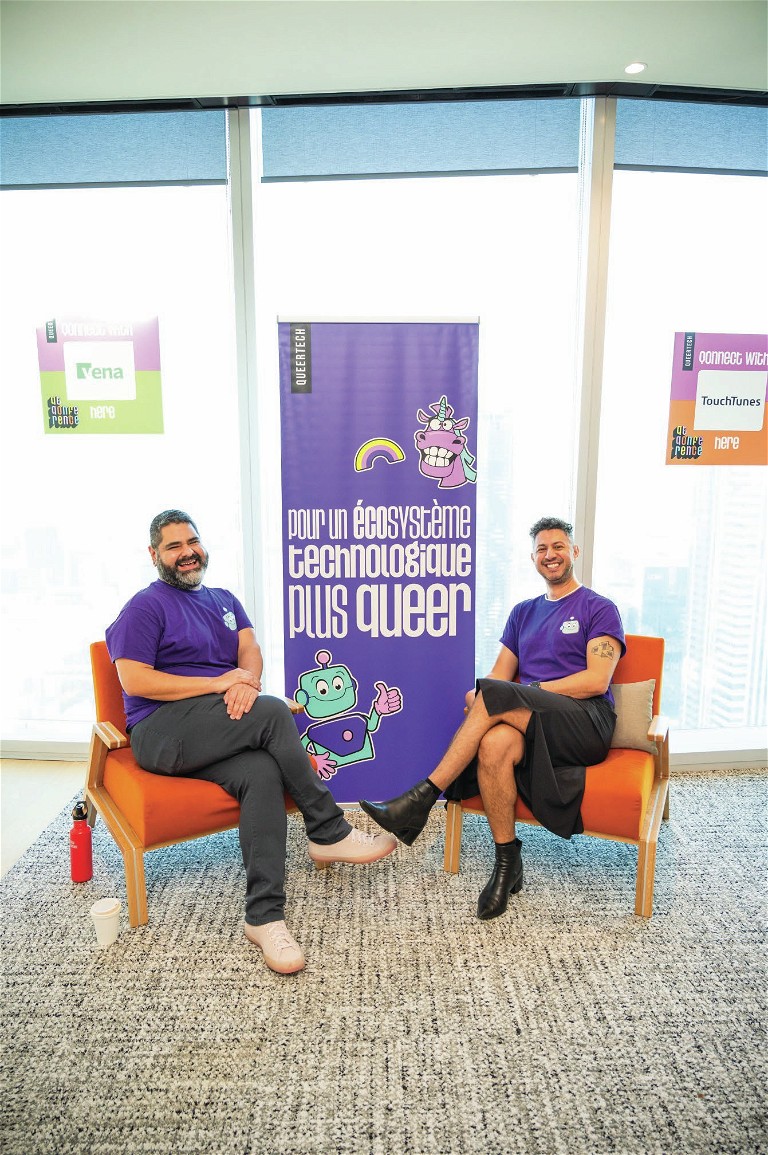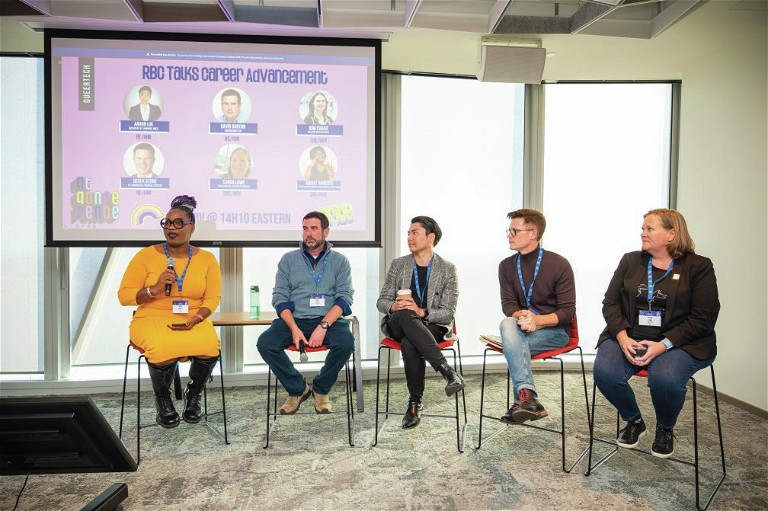QUEERING the TECH SPACE
First-ever “Qonference” builds on QueerTech’s foundations
By Matthew Bradford

Connections were made and communities engaged during QueerTech’s first-ever national “Qonference.” Held November 10-11, 2022, the hybrid event united 2SLGBTQIA+ professionals across the Canadian tech sector to raise profiles, break barriers and empower careers.
“The event went way beyond our expectations,” says Naoufel Testaouni, CEO & Co-Founder of QueerTech. “Our goal was to have maybe a couple hundred people show up, but in the end, we had over 400 people come out.”
“To me, that really showed how important it was to create this opportunity for queer people to claim their space within the tech community and have their voices heard,” he adds.

CREATING SPACE
The 2022 Qonference took place at the Microsoft Canada office in Toronto’s CIBC Square tower. The event was designed to provide individuals in the early stages of their tech careers with a safe and supportive environment in which to acquire the tools, insights and contacts they need to make their mark in the field.
Over the span of two days, in-person and virtual attendees enjoyed workshops, inspirational conversations and expert-led panels.
“Coming out of COVID-19, the show’s theme was focused on empowering people to get back out there, find their strength and start growing their careers,” says Testaouni.
The event was supported and attended by representatives from some of the biggest names in tech. Among them was Caroline Tutakiewicz, Senior Director, Fraud & Security Risk Oversight with RBC Canada, who shared her experience as a leading queer voice in the tech world during the event’s keynote presentation.
“Caroline was amazing. Her talk on being queer in the corporate world and advancing her career resonated with many people,” recalls Testaouni.
“That’s one of our main goals for these conferences: to inspire the community,” he continues. “We want people to learn and grow from one another, because that’s one of the biggest missing pieces for queer people in this industry. We don’t always see people like us in similar stages of their careers, or we might work with them but not realize they’re queer. So it’s nice to have a space where these leaders can come and share their stories, talk about their struggles and successes, and inspire everyone listening.”
MEANINGFUL CONNECTIONS
Making connections is often one of the hardest – if not most intimidating – aspects of any conference. To that end, QueerTech’s goal for the Qonference was to facilitate connection and collaboration between guests and presenters at every turn. One strategy for this was the inclusion of breakout sessions throughout the two-day event that encouraged attendees to strike up conversations with peers and shake hands with industry reps. Another was to equip all guests with the Brella event app, which enabled users to see who was in attendance (physically and virtually), read their profile, book chats and begin forming networks that could last well beyond the final day.
“We use Brella for all of our virtual conferences and job fairs, and I know that, for the Qonference, it was used to make over 1,000 connections over those two days,” Testaouni reports. “That’s amazing to us. Building a network is one of the key things we want our community to get out of our events, because that’s how you build your career and advance.”
READY FOR ROUND TWO
The Qonference’s success already has Testaouni brainstorming its return. And while no date is set, he tells QBiz that the next iteration will offer even more opportunities for guests to come together.
“For example, we want to create even more casual opportunities for people to maybe play a board game, sing karaoke or do their nails while they chat with someone,” he says. “There are a lot of introverts in the QueerTech community who want to connect and talk to people, but haven’t always been successful in doing that in a formal networking structure. So we want to create activities where the stress is off and people can just have open, casual conversations while they do something fun.”
Feedback from this year’s Qonference has inspired QueerTech to think about how it can expand the scope of its programming. Ideas include expanding into more technical topics, adding leadership training or delving deeper into important issues such as mental health.
“We learned a lot from this year, and it’s got us thinking about a variety of content we can add for the next time,” says Testaouni. “For instance, what we realized when talking to our guests is that some people liked panels while others preferred peer groups. So maybe we don’t need to have a topic and a panel and speakers for every session. Maybe we create more peer groups where – if you’re a queer product manager, for example – you can go and [connect] with other product managers and share your challenges and struggles.”
“Overall, we’re trying to get more creative and think of a variety of ways for people to learn and connect beyond those traditional panels and sessions.”
QUEERING THE TECH SPACE
QueerTech was founded on the pillars of community, inclusion, personal growth and pride – pillars that informed and supported every aspect of its first national event. Testaouni is thankful for the Qonference’s success and to hear that these guiding principles resonated with everyone who came out.
“Conferences are very hard when you don’t know people and feel like you don’t belong, but one of the things I’ve heard a lot from individuals at the Qonference was that they felt happy, excited and welcomed,” he notes. “I even felt it, myself – a vibe where it felt like everyone knew everyone, even if it was the first time they met.” ■